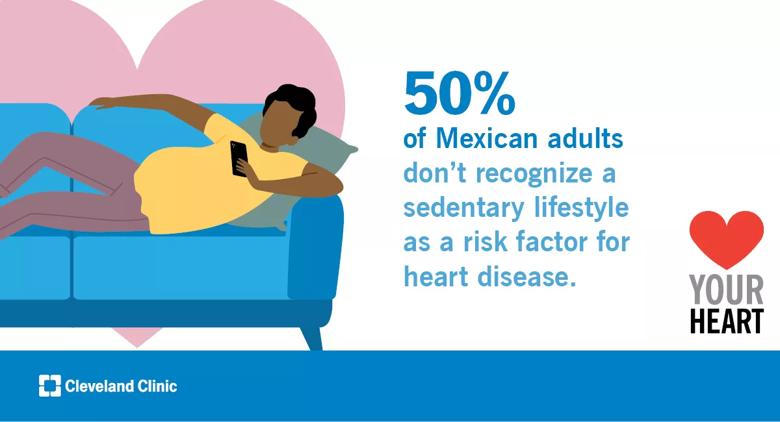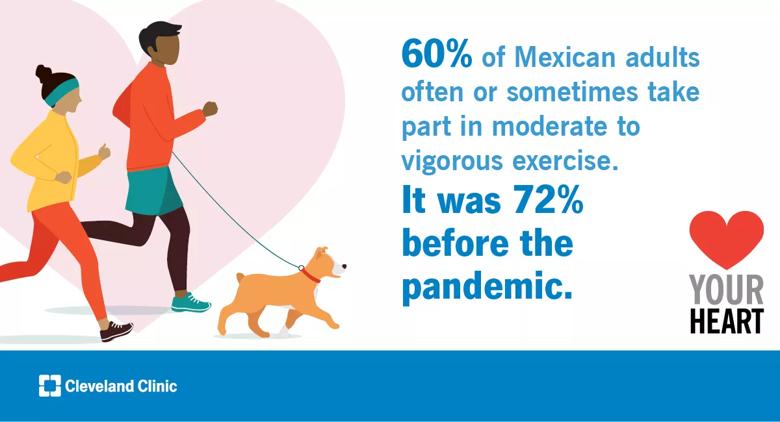With heart disease on the rise, a survey of adults across the country finds only half follow a specific diet plan and many are unaware of modifiable lifestyle risks

MEXICO CITY: A survey of Mexican adults commissioned by global health system Cleveland Clinic has found activity levels have dropped generally since the pandemic started, and that the proportion of people who rarely or never do moderate to vigorous exercise has risen from 28% to 40%. Furthermore, almost half of the respondents did not recognize insufficient exercise (49%) and a sedentary lifestyle (50%) as risk factors for heart disease.
When presented with a list of 12 risk factors, obesity (identified by 73%), stress (65%) and high blood pressure (63%) were most recognized as increasing the risk of heart disease. However, many did not identify key modifiable risk factors such as smoking/vaping (identified by only 54%), not exercising enough (51%) and a sedentary lifestyle (50%). Even fewer recognized that lack of sleep (33%), over exercising (17%) and poor dental health (17%) can increase your risk of developing heart disease.

Image content: This image is available to view online.
View image online (https://assets.clevelandclinic.org/transform/68c3fc92-5ef7-477d-be98-cc24c38d6286/22-CCC-2729359-Mex1-1200x650-1_jpg)
“Recent figures indicate that heart conditions are the leading cause of death in Mexico. The good news is that around 90% of heart disease is preventable; a heart-healthy diet, regular exercise, and not smoking are some of the things all patients are able to do, so we need to create greater awareness of this,” said J. Emanuel Finet, M.D., cardiologist in the Heart, Vascular & Thoracic Institute at Cleveland Clinic. “This is particularly important during the current global health crisis, as our survey also shows a general decrease in physical activity levels after the onset of the COVID-19 pandemic.”
According to the survey, Mexican adults reported a general decrease in the amount of exercise they did before and after the onset of the pandemic in March 2020. Prior to the pandemic, 72% of Mexican adults often or sometimes performed moderate to vigorous exercise and 83% stated that they walked throughout the day. In comparison, 60% of adults currently perform moderate to vigorous exercise often or sometimes and 74% walk throughout the day often or sometimes.
The drop in moderate to vigorous exercise after the pandemic was generally uniform across generations — a 10-12 percentage point increase in those who exercised rarely or never, with Gen Z rising from 31% to 43%, Millennials rising from 29% to 41%, Gen X rising from 28% to 39% and Boomer’s rising from 24% to 34%.
Other notable results from the survey were related to perceptions of which diets are most heart healthy and which diets Mexicans currently follow. When presented with a list of 10 diets, 45% of adults surveyed identified a low-carbohydrate diet to be among the most heart-healthy, followed by a vegetarian diet including eggs and dairy (27%) and a vegan diet (27%). Only 15% of the Mexicans identified the Mediterranean diet, which is recommended by global bodies such as the American Heart Association, as being heart healthy.
While 52% of all respondents said they did not currently follow any specific dietary plan, 24% reported they followed a low-carbohydrate diet.

Image content: This image is available to view online.
View image online (https://assets.clevelandclinic.org/transform/71238dc2-50c2-4483-9ae3-7a9a6e89aab0/22-CCC-2729359-Mex2-1200x650-1_jpg)
“To promote heart health through diet, we currently recommend people cut down on saturated and trans fats, and limit sweets, sugary foods and alcohol; moreover, increase their intake of fruits and vegetables, as well as legumes and nuts; focus on eating fish, seafood, and lean poultry, as well as high fiber-containing foods such as whole grains,” Dr. Finet said.
Cleveland Clinic, a global health system first established in the US in 1921, regularly commissions heart health surveys in various countries. The Mexican survey was conducted in January this year, and is being published now as part of Cleveland Clinic’s global heart health awareness initiative.
Cleveland Clinic is the No.1 hospital in the world for cardiac surgery, according to Newsweek’s World’s Best Specialized Hospitals of 2022. Cleveland Clinic has been ranked the No. 1 hospital in the country for cardiology and cardiac surgery for 27 years in a row by U.S. News & World Report.
Cleveland Clinic has been a leader in heart care since the 1940s, when Arda Green, M.D., and Irvine Page, M.D., led research teams that isolated serotonin and linked high blood pressure to heart disease.
Cleveland Clinic’s cardiac-related discoveries and “firsts” have continued since then. Cleveland Clinic has:
Survey methodology: All figures, unless otherwise stated, are from YouGov Plc. Total sample size was 1,041 adults. Fieldwork was undertaken from 17-21 January 2022. The survey was carried out online. The figures have been weighted and are representative of all Mexican adults (aged 18+).
Cleveland Clinic is a nonprofit multispecialty academic medical center that integrates clinical and hospital care with research and education. Located in Cleveland, Ohio, it was founded in 1921 by four renowned physicians with a vision of providing outstanding patient care based upon the principles of cooperation, compassion and innovation. Cleveland Clinic has pioneered many medical breakthroughs, including coronary artery bypass surgery and the first face transplant in the United States. Cleveland Clinic is consistently recognized in the U.S. and throughout the world for its expertise and care. Among Cleveland Clinic’s 82,600 employees worldwide are more than 5,786 salaried physicians and researchers, and 20,700 registered nurses and advanced practice providers, representing 140 medical specialties and subspecialties. Cleveland Clinic is a 6,728-bed health system that includes a 173-acre main campus near downtown Cleveland, 23 hospitals, 280 outpatient facilities, including locations in northeast Ohio; Florida; Las Vegas, Nevada; Toronto, Canada; Abu Dhabi, UAE; and London, England. In 2024, there were 15.7 million outpatient encounters, 333,000 hospital admissions and observations, and 320,000 surgeries and procedures throughout Cleveland Clinic’s health system. Patients came for treatment from every state and 112 countries. Visit us at clevelandclinic.org. Follow us at x.com/CleClinicNews. News and resources are available at newsroom.clevelandclinic.org.
Editor’s Note: Cleveland Clinic News Service is available to provide broadcast-quality interviews and B-roll upon request.